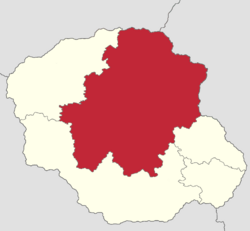Dellish Community
Dellish Community
Dellsk Mienskip (Dellish) | |
|---|---|
|
Coat of arms of Dellish Community Coat of arms | |
 The Dellish Community within Alsland | |
| Country | |
| Provinces | Aldtsjerk Herne Lower Delland Middewald Upper Delland Wottested Yndyk |
| Established | 1920 |
| Capital | Wottested |
| Government | |
| • Executive | Dellish Government |
| • Governing coalition | Maitiid |
| • Minister-President | Felkert Smits |
| • Legislature | Senate of Delland |
| • Provincial Minister-Presidents | X |
| Population | |
| • Total | 3,611,545 |
The Dellish Community (Dellish: Dellsk Mienskip), is a Polity in Alsland and one of 4 Communities of Alsland. It is the largest community in terms of population which was 3,611,545 in 2019 or 31.4% of Alsland's total population. The Dellish Community is comprised of 7 provinces - Aldtsjerk, Herne, Lower Delland, Middewald, Upper Delland, Wottested, Yndyk - of these provinces X is the largest in terms of land area and population. The capital of the Dellish Community is Wottested in the Province of Delland, it was moved from Yndyk in 2004.
In Medieval times the Duchy of Delland largely comprised of the area surrounding Wottested and much of northern Delland. It's size varied throughout history but it came to occupy most of the present-day community alongside much of Martiland, the Duchy was based around the cities of Yndyk and Leens and was one of the most influential states in the area for much of the middle ages. Delland was absorbed directly into Kirenia following the Ten Years' War. It was subsequently annexed by the Weranian Republic in 1797. It was reincorporated into Kirenia after the downfall of the Weranian Republic. Delland became the industrial heartland of eastern Kirenia during the industrial revolution, it's newfound economic prosperity led to growing calls for a Dellish nation. The 1919 Dellish Revolution led to the independence of Delland. The Republic of Delland was subsequently reformed into Alsland after the Great War which saw the country's systems restructured significantly.
Delland borders every other community in Alsland alongside Kirenia in the west. It has a large Kirenian and Martish minority in Middewald which comprises of the southern regions of the province. It also has a large Swathish minority in the Havanfenn valley and southern Wottested. A small Weranian minority also exists in Yndyk and Wottested. The Dellish Community is bordered by the Holsaten Community in the north, the Swathish Community in the east, the Martish Community in the south and Kirenia in the west.
History
Emergence of the Duchy of Delland (742—1027)
Delland in the Rudolphine Confederation (1027—1721)
Transneevan Republic and occupation by Kirenia (1721—1919)
Independence and autonomy in Alsland (1919—Present)
Government and politics
The Dellish Community was first established in 1920 to represent the Dellish population of Alsland. It was reformed after the Great War to function as an autonomous region in Alsland covering the Dellish Provinces of Alsland. The Senate of Delland is the unicameral legislative body of the Community and has 190 members, 2 members of the Senate are elected to serve as the co-Presidents of the Senate and do not vote unless there is a tie when one of them will vote. The Parliament is elected every 4 years via the party-list proportional representation electoral system that is used throughout Alsland. The Senate of Delland meets in the New Ytkesynpaleis in Wottested.
The Minister-President of the Dellish Community is the directly-elected head of government of the Dellish Community. The Minister-President presides over the Dellish Government. There have been 4 elected Minister-Presidents since the position was made directly elected in 1997: Bonne Zijlstra (1994–1998), Peke Ringnalda (1998–2006), Pyns Tigchelaar (2006–2014) and Felkert Smits (2014–present, first appointed as acting Minister-President following the death of Tigchelaar). The Dellish Government is the primary executive branch of the Dellish Community and comprises of 13 ministers led by the Minister-President and accountable to the Senate.


